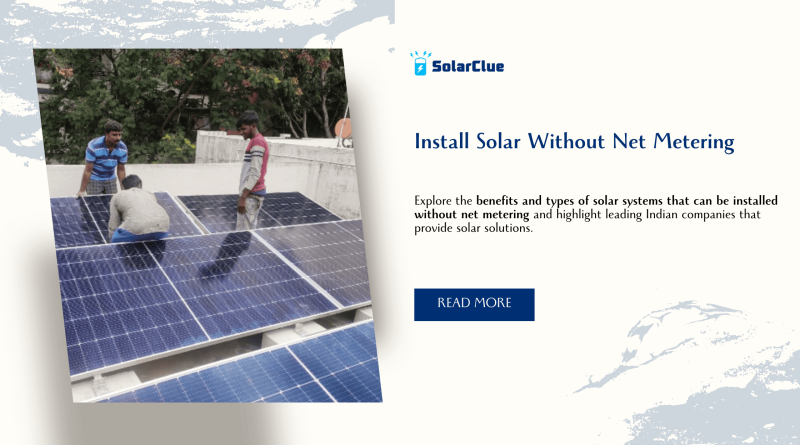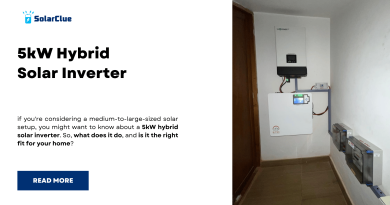Install Solar Without Net Metering
Solar energy has become a popular option for homeowners, businesses, and institutions across India due to its environmental benefits and cost-saving potential. While net metering allows consumers to export excess electricity to the grid and earn credits, many individuals and businesses are exploring alternatives to installing solar systems without net metering. These alternatives include off-grid and hybrid solar systems, which provide energy independence and uninterrupted power supply, making them suitable for areas with frequent power outages or no grid access.
In this blog, we will discuss the benefits and types of solar systems that can be installed without net metering and highlight leading Indian companies that provide solar solutions.
Table of Contents
What Does Installing Solar Without Net Metering Mean?
When you install a solar system without net metering, your system is not connected to the grid, meaning you cannot export excess electricity for credits or receive a reduction on your electricity bill from the utility company. This setup is ideal for locations with unreliable grid access or for consumers looking to maximize energy independence.
There are two main types of solar systems that work without net metering:
1. Off-Grid Solar Systems
An off-grid solar system is completely independent of the grid. It generates electricity from solar panels and stores excess energy in batteries. These systems are ideal for remote areas where access to the grid is limited or non-existent.
Key Features of Off-Grid Solar Systems:
- Battery Storage: Off-grid systems require batteries to store excess electricity for use when solar energy is unavailable, such as during the night or on cloudy days.
- Complete Independence: Consumers are entirely independent of the grid, making off-grid systems suitable for areas with unreliable or no grid connections.
- No Feed to the Grid: Unlike net metering, off-grid systems do not allow consumers to export excess electricity to the grid.
2. Hybrid Solar Systems
A hybrid solar system combines both solar power and battery storage while also being connected to the grid. This setup provides greater flexibility because consumers can use solar energy when it is available, rely on battery storage when needed, and use the grid as a backup.
Key Features of Hybrid Solar Systems:
- Battery Backup: Hybrid systems store excess energy in batteries, providing power during outages or at night.
- Grid Connection: The system can switch to grid power when solar and battery power are insufficient.
- No Export: In some cases, hybrid systems can be installed without exporting energy to the grid, depending on the consumer’s choice or regulatory restrictions.
Benefits of Installing Solar Without Net Metering
1. Energy Independence
By installing an off-grid or hybrid solar system, consumers can become energy-independent. This is particularly beneficial for areas with frequent power outages or remote locations with no access to the grid. Having an energy storage system (batteries) ensures that you have a reliable source of power even during grid downtime.
2. Uninterrupted Power Supply
Off-grid and hybrid solar systems with battery backup offer an uninterrupted power supply. This feature is critical in areas with unreliable electricity grids or frequent power cuts, ensuring continuous electricity for essential appliances and devices.
3. Ideal for Remote Areas
In remote areas where the grid is either unavailable or unreliable, off-grid solar systems provide a sustainable and practical solution for electricity generation. These systems can power homes, farms, and small businesses, reducing dependence on costly diesel generators.
4. Environmental Impact
Solar energy is a clean, renewable resource that reduces carbon footprints. By generating electricity from solar, consumers reduce their reliance on fossil fuels, contributing to a greener and more sustainable environment.
5. No Grid Dependency
For consumers who wish to avoid interactions with utility companies or are unable to participate in net metering due to regulatory constraints, installing a solar system without grid export is a viable option. It offers control over energy production and consumption without relying on the grid.
Leading Indian Companies for Solar Installations Without Net Metering
Several Indian companies provide reliable and high-quality solar solutions for off-grid and hybrid systems. Here are some of the top solar companies in India that offer off-grid and hybrid solar installations:
1. Tata Power Solar
Tata Power Solar is one of India’s largest solar companies, offering a wide range of solar products, including off-grid and hybrid solar systems. Their solutions are ideal for both residential and commercial consumers looking for energy independence without grid connectivity. Tata Power Solar also provides battery storage solutions to ensure uninterrupted power supply.
2. Varistor Solar
Varistor Solar is a growing player in India’s solar market, known for its efficient and innovative solar products. The company offers off-grid and hybrid solar systems, providing solutions for homes, businesses, and remote locations. Loom Solar also specializes in lithium battery storage, which is essential for reliable energy supply when disconnected from the grid.
3. Waaree Energies
Waaree Energies is another leading Indian solar company that provides comprehensive solar solutions, including off-grid and hybrid systems. Their products are designed to offer maximum efficiency and energy storage capabilities, making them suitable for consumers looking to install solar systems without net metering.
4. Vikram Solar
Vikram Solar is a global solar solutions provider based in India. The company offers high-performance solar panels and off-grid systems that are well-suited for rural and remote areas. Their solar systems can be customized for both residential and commercial installations without requiring net metering.
5. Adani Solar
Adani Solar is a leading solar manufacturer and EPC (Engineering, Procurement, and Construction) provider in India. Adani Solar offers off-grid and hybrid solar solutions with battery storage for consumers seeking energy independence and reliable electricity in areas without net metering options.
Key Considerations Before Installing Solar Without Net Metering
1. Battery Storage
When installing an off-grid or hybrid system, having a reliable battery storage solution is critical. Batteries allow you to store excess energy generated during the day for use during the night or during power outages. Consider lithium-ion batteries for longer life and efficiency.
2. Initial Investment
Off-grid and hybrid systems typically involve higher upfront costs than grid-tied systems due to the inclusion of batteries. However, these systems offer long-term savings by reducing electricity bills and providing uninterrupted power.
3. Energy Consumption
Before deciding on the size of your solar system, assess your household or business’s energy consumption. This ensures that the system you install generates enough electricity to meet your needs without relying on the grid.
4. Maintenance
Regular maintenance, including cleaning solar panels and checking battery health, is essential to keep your off-grid or hybrid system running efficiently. Choose companies that offer robust after-sales support and maintenance services.
Conclusion
Installing solar systems without net metering offers a viable alternative for consumers seeking energy independence and reliable power. Whether you’re in a remote location or looking for an uninterrupted power supply during frequent outages, off-grid and hybrid solar systems provide an effective solution. With support from top Indian solar companies like Tata Power Solar, Loom Solar, and Waaree Energies, adopting solar power has never been more accessible.
By investing in solar energy, consumers can enjoy long-term savings, reduce their carbon footprint, and contribute to India’s growing renewable energy landscape.
Ready to Save on Electricity Bills with Solar Power?
With Net Metering, you can drastically reduce your electricity costs by generating your own solar power and sending any excess back to the grid. It’s time to harness the sun’s energy and make a positive impact on both your wallet and the environment!
At SolarClue, we make the transition to solar simple, efficient, and affordable. Whether you’re a homeowner, business, or institution, our team of solar experts will guide you through the process—from installation to maintenance—so you can start saving from day one.
🌞 Take the first step towards energy independence today!
🔋 Get your solar consultation now!
Contact SolarClue or call us at +91-888-4444-830 to explore the best solar solutions for your home or business.
Go Solar. Save More. Power Your Future with SolarClue!
FAQs
1. What is the difference between off-grid and hybrid solar systems?
Off-grid systems are entirely independent of the grid and rely on battery storage for electricity. Hybrid systems are connected to the grid but also use batteries, providing greater flexibility and backup power.
2. Can I install a solar system without net metering?
Yes, you can install off-grid or hybrid solar systems without net metering. These systems allow you to generate your own electricity and store excess energy in batteries.
3. How much does it cost to install an off-grid solar system?
The cost depends on the size of the system and battery capacity. Typically, off-grid systems have higher upfront costs due to the need for batteries but offer long-term savings.
4. Which is better, off-grid or hybrid systems?
The choice depends on your location and energy needs. Off-grid systems are ideal for remote areas without grid access, while hybrid systems offer flexibility and can use the grid as a backup.
5. What are the benefits of using a solar system without net metering?
Benefits include energy independence, uninterrupted power supply, and reduced reliance on the grid, especially in areas with frequent power outages.




